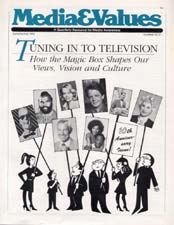Outside From the Inside: Television in Jail
|
This article originally appeared in Issue# 40-41
|
Jail is a cold place. Walls of thick concrete block every intrusion by the sun. The cells, too, are made of concrete, and plexiglass and iron. Refrigerator-bright fluorescent lights announce the day at 5 am. and dim only at 11 p.m.. remaining on throughout the night. Gray, and its nauseous cousin, light green, color your bunk, your blanket, your one sheet, even the plate (a tray) from which you eat.
But in this lower depth, where men and women have been secreted away from society, there is one window through which the imprisoned can see the outside world — where they so desperately wish to return. Only one small window, but it is radiantly colorful, miraculous, and bright. That window is television.
Ten times over the past 10 years I've been inside of jail. Arrested for acts of civil disobedience, I was motivated by concern for America's conscience, as our nation prepares for nuclear war. In many ways, my time in jail brought great opportunity. Behind these walls I was given new eyes, even as a contemplative from within a cloister sees many things in the world that the free blindly ignore. Imprisoned, I was able to observe not only the values society imparts, through the medium of television, to its prisoners, but I was also given insight into how this medium affects that broader captive audience, the public at large.
In trying to understand the messages television communicates — regarding sex, violence, and other hot issues of the day — we usually think of how it affects children and the measures we should take to protect them. However noble this outlook may be, it presumes that adults are sufficiently equipped to handle depictions of emotional breakdown, rape, war, murder, and (perhaps the most harmful) stereotypical portrayals of women, blacks and other disempowered groups.
Few consider the varying maturity and sensibilities of adult viewers, let alone prisoners. Has the question ever been asked: Do we truly want the most hardened and disillusioned members of society to watch and receive instruction from shows that contain violence and criminality? If there are programs and subject matter that are inappropriate models of behavior for children, when do they become appropriate for adults, and especially for those adults who are supposedly being rehabilitated into society? Special-effect car crashes and gun shots may be diversions, and thought of as mindless fun, but they do reverberate outside the screen and into the lives of the viewer. It's a strange notion that puts television in amoral void apart from the rest of the universe.
Common Humanity
The first and most profound realization about jail, at least for this middle-class kid, was how human these "criminals" were, and how different from the cold-blooded automatons depicted on television. TV's criminals have no families and no history and are so malevolent you think the world is better off without them. With the fadeout the world is safe till next week. Death is a solution.
However, real criminals don't go away when the TV is off. Instead they sit in jail and live and breathe and hope for a better day.
All the inmates I've met had mega-problems. Minimally, they expected to lose their jobs, or their spouses or lovers. For most, poverty had been in their families for generations. Life was a pit, and they had to claw to get out. These were trounced and broken men. Yet their brokenness is indicative of a more chronic social disorder. After all, these crooks keep reappearing each week.
Cops and Robbers
Admittedly, as a prisoner, there have been times when television has been a welcome distraction. Nye County Jail, in Tonopah, Nevada, offers Home Box Office; we watched the film Gandhi the morning after being arrested for an action at the nearby nuclear test site. But despite the temporary escape it provides. television has usually been an ill-mannered cellmate, a constant source of noise, keeping the same hours as the fluorescent lights.
With the deputy on duty choosing the channels, it's interviews and cop-show reruns during the day and more cops-and-robbers in prime time, with lawyer sagas, courtroom dramas and crime-oriented newscasts for a change of pace. Even supposedly non-crime melodramas like Dynasty thrive on a diversity of sins such as blackmail, adultery and embezzlement. Western showdowns and quack doctors complete the picture. Transgressing the law is a booming business. Not only are transgressions in demand, but lawlessness is made to appear commonplace, as if everybody's doing it. If television is any indication, Americans are obsessed with criminality. The window that looks out from jail also looks in.
America's obsession with criminality has somehow entered our souls. Its corollary, that death is an expedient solution to social problems, manifests itself in a rise in urban crime, a resurgent support for the death penalty, and the silent acceptance of our nation's avowed threat to wage nuclear war. It also shows upon television. TV's window on the world reflects our acquiescence to that violence and the human waste that makes it possible.
Unfortunately, the cardboard treatment of TV criminals corresponds to society's willingness to ignore and despise the real people their TV shadows represent. We need real attempts to address the problems in their lives, including self-esteem and self-respect, not more cells, longer sentences — or cop shows.



